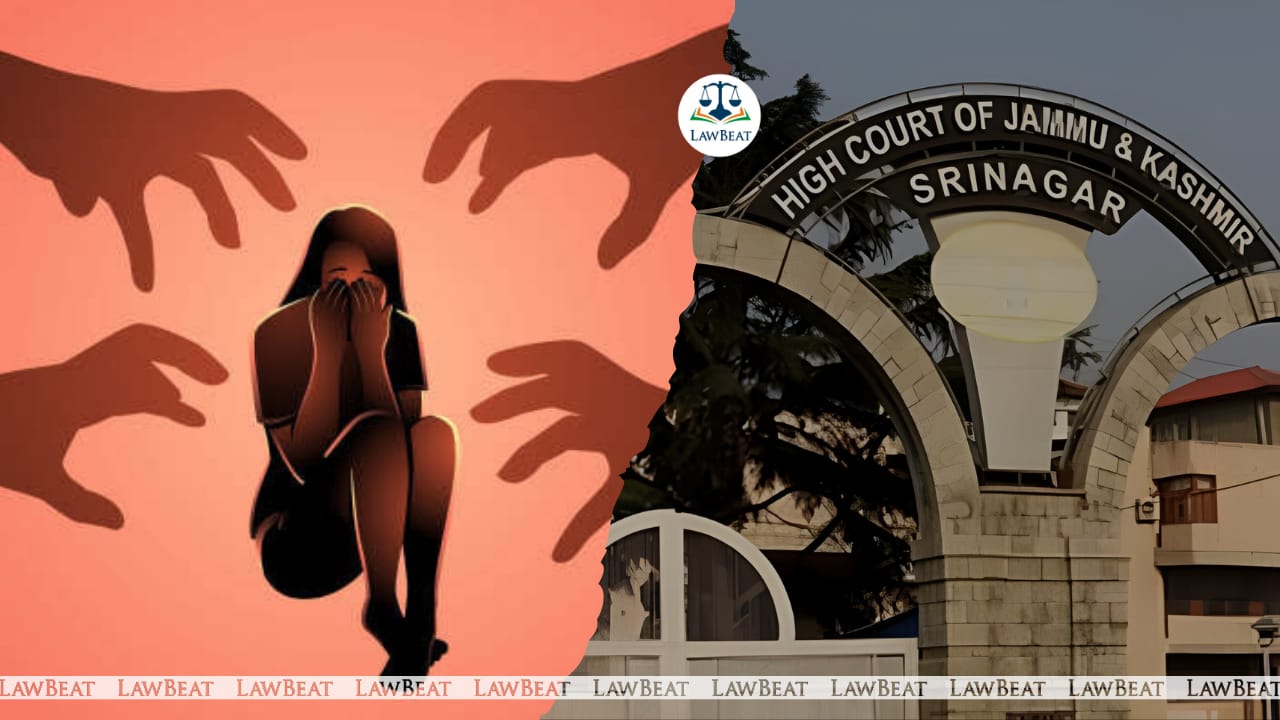No Conviction on Solitary Statement If Evidence Not of ‘Sterling Quality’: J&K and Ladakh HC Acquits Rape Accused

The court found the prosecutrix's testimony insufficiently credible, marked by significant gaps and contradictions
The Jammu & Kashmir and Ladakh High Court has held that a conviction in a rape case can be based on the solitary statement of the victim, provided it is of “sterling quality”. However, if the testimony of the victim is not clear, consistent, and trustworthy, the same cannot form basis of a conviction.
The court, presided over by Justice Rajnesh Oswal, observed : “It is settled law that the accused can be convicted on the basis of solitary statement made by the prosecutrix/victim but for that purpose, the statement of the prosecutrix must be clear, unambiguous and not improbable in nature. If the statement of the prosecutrix is not of sterling quality, then the accused cannot be convicted on the solitary statement of the prosecutrix, and the attending circumstances are also required to be looked into.”
The court’s observation came while setting aside the trial court's conviction order against two men, accused of rape in a decades-old case. The prosecution's case stemmed from a First Information Report (FIR) filed by the prosecutrix on March 01,1997. She claimed that on February 13,1997, while she went to get a frying pan from her neighbour, she was accused of impropriety and attempting to avoid confrontation, she headed to her maternal aunt’s home. There, one of the accused, Noor Mohammad persuaded her to board an auto-rickshaw. Inside, she found Abdul Gani Akhoon. She alleged that she was blindfolded with her dupatta, taken to an unknown location, confined in a room, and raped by Abdul Gani while Noor Mohammad guarded the door. After 16 days, she was released and filed an FIR.
A charge sheet was later filed, and the case was transferred to the Sessions Court for trial. The trial court convicted Abdul Gani of offences under Sections 376, 366, and 344 of the Ranbir Penal Code (RPC), sentencing him to rigorous imprisonment of seven years, two years, and one year, respectively. While Noor Mohammad was convicted of offences under Sections 366 and 344 RPC and sentenced to two years and one year of imprisonment, respectively. Both accused/appellants were also fined Rs. 2,000 each.
Abdul Gani Akhoon challenged the judgment on the grounds that the Trial Court relied solely on the prosecutrix's testimony without corroboration from other witnesses. It was asserted that the investigation failed to establish critical facts, such as the identity of the location where the prosecutrix was confined and the identity of the auto-rickshaw driver. Noor Mohammad also appealed against the trial court’s verdict, contending that the judgment was against the weight of evidence and argued that the Trial Court had failed to properly evaluate the evidence presented.
The High Court noted several contradictions in her statements during cross-examination. For instance, she stated she was blindfolded while being transported but later claimed she could see her surroundings during her release. Furthermore, the site of her confinement was never identified, despite her assertions that she could recognize it. The medical evidence also failed to support the allegations. While the prosecutrix claimed to have visible injuries, the medical report recorded no signs of violence. Additionally, inconsistencies emerged regarding the seizure of her clothes, with no mention of the torn clothing she alleged.
Citing previous Supreme Court rulings, including Nirmal Premkumar v. State, Rai Sandeep v. State (NCT of Delhi) and Krishan Kumar Malik v. State of Haryana, the court emphasised that a victim's sole testimony requires corroboration when inconsistencies or material deficiencies are evident. “The statement of the prosecutrix ought to be consistent from the beginning to the end (minor inconsistences excepted), from the initial statement to the oral testimony, without creating any doubt qua the prosecution's case. While a victim’s testimony is usually enough for sexual offence cases, an unreliable or insufficient account from the prosecutrix, marked by identified flaws and gaps, could make it difficult for a conviction to be recorded,” the court noted.
The court, highlighting the material contradictions in the statement of the prosecutrix, stated, “it cannot be said that her evidence is of sterling quality, which can be relied upon for convicting the appellants. The evidence led by the prosecution is not convincing, cogent that may result in conviction of the appellants.”
The court concluded that the trial court failed to rightly appreciate the evidence stating that “in view the loopholes and gaps in the evidence of the prosecution, the benefit of doubt was required to be given to the appellants.” Thus, overturning the judgment of the trial court, the High Court acquitted the appellants of all charges.
Cause Title: Abdul Gani Akhoon v State of J&K
